
Education in Canada is for the most part provided publicly, and is funded and overseen by provincial, territorial and local governments. Education is within provincial jurisdiction and the curriculum is overseen by the province. Education in Canada is generally divided into primary education, followed by secondary education and post-secondary. Within the provinces under the ministry of education, there are district school boards administering the educational programs.

Pond Inlet is a small, predominantly Inuit community in the Qikiqtaaluk Region of Nunavut, Canada, located on northern Baffin Island. To the Inuit the name of the place "is and always has been Mittimatalik." The Scottish explorer Sir John Ross had named an arm of the sea that separates Bylot Island from Baffin Island as Pond's Bay, and the hamlet now shares that name. On 29 August 1921, the Hudson's Bay Company opened its trading post near the Inuit camp and named it Pond Inlet, marking the expansion of its trading empire into the High Arctic.

Cambridge Bay is a hamlet located on Victoria Island in the Kitikmeot Region of Nunavut, Canada. It is the largest settlement on Victoria Island. Cambridge Bay is named for Prince Adolphus, Duke of Cambridge, while the traditional Inuinnaqtun name for the area is Ikaluktutiak or Iqaluktuuttiaq meaning "good fishing place".
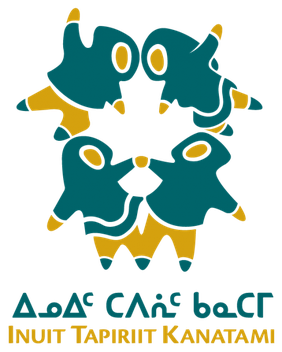
Inuit Tapiriit Kanatami, previously known as the Inuit Tapirisat of Canada, is a nonprofit organization in Canada that represents over 65,000 Inuit across Inuit Nunangat and the rest of Canada. Their mission is to "serve as a national voice protecting and advancing the rights and interests of Inuit in Canada."

Nunavut Arctic College is a public community college in the territory of Nunavut, Canada. The college has several campuses throughout the territory and operates as a public agency funded by the territorial government.
Aurora College, formerly Arctic College, is a college located in the Northwest Territories, Canada with campuses in Inuvik, Fort Smith and Yellowknife. They have learning centres in 23 communities in the NWT. The head office for Aurora College is located in Fort Smith.
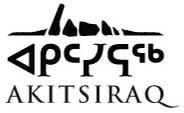
Akitsiraq Law School is a legal education program designed to increase the number of lawyers in Nunavut and the Canadian Arctic, including a program leading to a Bachelor of Laws Degree (LL.B.) in Iqaluit, Nunavut.
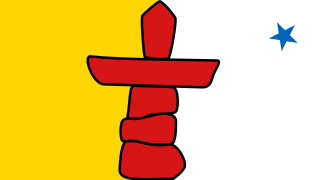
Nunavut is the largest and northernmost territory of Canada. It was separated officially from the Northwest Territories on April 1, 1999, via the Nunavut Act and the Nunavut Land Claims Agreement Act, which provided this territory to the Inuit for independent government. The boundaries had been drawn in 1993. The creation of Nunavut resulted in the first major change to Canada's political map in half a century since the province of Newfoundland was admitted in 1949.
Nunavut Public Library Services (NPLS) is the public library system serving the citizens of the Canadian territory of Nunavut. The libraries which comprise Nunavut Public Library Services exist in three communities: Qikiqtani, Kivalliq, and Kitikmeot.
A part-time student is a non-traditional student who pursues higher education, typically after reaching physical maturity, while living off-campus, and possessing responsibilities related to family and/or employment. Part-time student status is based on taking fewer course credits in a semester than full-time students. Part-time students may choose to pursue part-time studies for a variety of different reasons. A benefit of pursuing higher education as a part-time student is the opportunity to be able to balance learning with work, family and other personal commitments. Not every program will have the option for part-time students to enroll. The selection of programs that are available in a part-time format will vary depending on the institution.

Higher education in Canada includes provincial, territorial, indigenous and military higher education systems.

Newfoundland and Labrador has had the same growing pains as other provinces in developing its own form of education and now boasts a very strong, although relatively small, system. The direction of Newfoundland and Labrador's policy has evolved rapidly since the late 1990s, with increased funding, participation rates, accessibility and transferability. Many of the directives the government has been acting upon in the past 10 years have been a result of recommendations that stemmed from a 2005 white paper: Foundation for Success: White Paper on Public Post-Secondary Education. It set the course for furthering the strategic directives of the provincial post-secondary education sector. Some of its recommendations aimed to:

Higher education in Manitoba traces the development and expansion of higher or advanced education in the province of Manitoba.
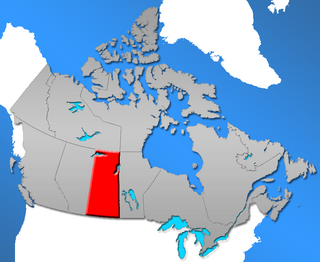
Historically, Saskatchewan's higher education system has been "significantly shaped" by demographics. In 1901, six years prior to the 1907 founding of a university in Saskatchewan, the urban population in Saskatchewan was 14,266 (16%) while the rural population was 77,013 (84%). One hundred years later, the proportions had changed significantly: urban population in 2001 was 629,036 (64%) while the rural population was 349,897 (36%). Over time the province's higher education system has changed significantly in response both to this demographic shift and to provincial politics.

Higher education in Alberta refers to the post secondary education system for the province of Alberta. The Ministry of Advanced Education in Alberta oversees educational delivery through universities, publicly funded colleges, technical institutions, and private colleges. These institutions offer a variety of academic and vocational pursuits. Students have access to post-secondary options through most regions of Alberta, and a developed articulation system allows for increased student mobility.

Higher education in the Northwest Territories traces the development and expansion of higher education in Canada's Northwest Territories. In Canada, education is a provincial or territorial concern and there is no national regulation nor accrediting body.
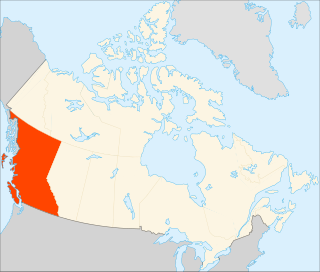
Higher education in British Columbia is delivered by 25 publicly funded institutions that are composed of eleven universities, eleven colleges, and three institutes. This is in addition to three private universities, five private colleges, and six theological colleges. There are also an extensive number of private career institutes and colleges. Over 297,000 students were enrolled in post-secondary institutions in British Columbia in the 2019-2020 academic year.
The Nunavut Teacher Education Program (NTEP), formerly the Eastern Arctic Teacher Education Program (EATEP), is an important college / university teacher education program in the territory of Nunavut and is offered through Nunavut Arctic College (NAC). This program provides Inuit from Nunavut with the opportunity to work toward a Bachelor of Education degree while remaining in the territory.
The Arctic Inspiration Prize is a $1 million CAD annual Canadian prize awarded to up to five diverse teams who have made a substantial, demonstrated and distinguished contribution to the gathering of Arctic knowledge and who have provided a concrete plan and commitment to implement their knowledge into real world application for the benefit of the Canadian Arctic and its Peoples. The Arctic Inspiration Prize defines the Canadian Arctic as the region including the Yukon, the Northwest Territories, the Inuvialuit Settlement Region, Nunavut, Nunavik and Nunatsiavut.
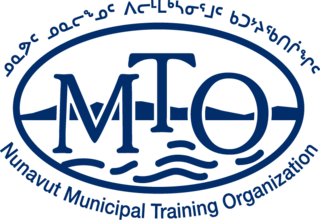
The Nunavut Municipal Training Organization (MTO) is a school for municipal staff throughout the Territory of Nunavut. Training is primarily geared towards the staff of Inuit communities in Canada's far north. Since its inception, the work of the Nunavut Municipal Training Organization (MTO) has evolved into three core activities; Training Programs, Program Development/Enhancement, and improving municipal operations in Nunavut's 25 communities. The training itself is divided into three main categories: the college-accredited Municipal Government Program through the Nunavut Arctic College, Protection Services training, and community-targeted training courses.

















